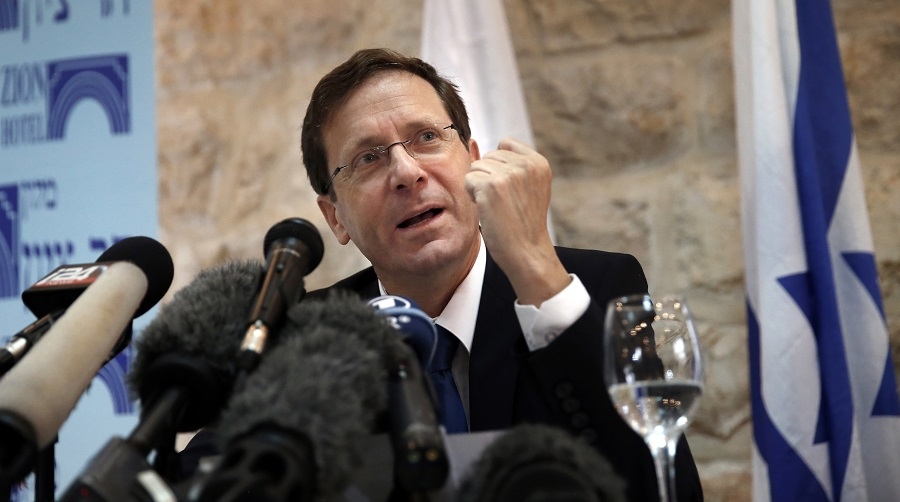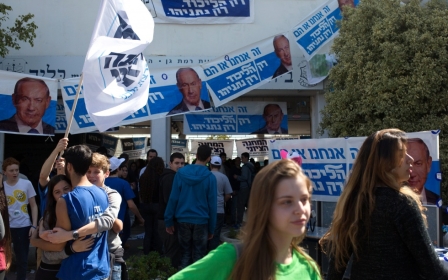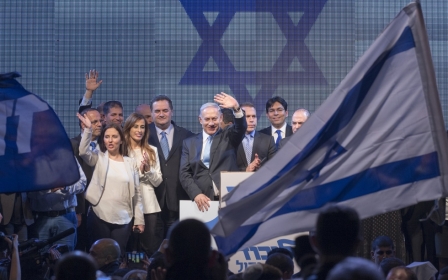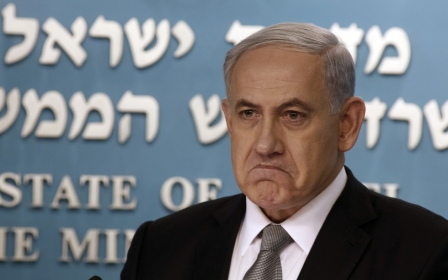ANALYSIS: 'Left-wing' Zionist Union pivoting right

Earlier this week, the Zionist Union party - main left-wing challengers to the incumbent Benjamin Netanyahu’s Likud - released their most nationalist ad yet. On the screen, an assortment of veterans of the IDF’s main signal intelligence unit, 8200, reflected breathlessly about a fellow veteran - Zionist Union chairman Isaac “Buji” Herzog.
“You can’t really reveal the type of stuff that Buji did,” gushed one.
“He grew up in our unit. This means he knows the Arab mentality,” another adds.
“He’s seen the Arabs on all kinds of occasions,” a voiceover of Haaretz contributor Yuval Elbashan explains against the backdrop of Arab women shopping in a market, cutting quickly to a bearded man agitating in a rally, superimposed with a sniper’s crosshairs.
“The most important person here is the one who decides that based on the information he’s got, Israel needs to take action … that it’s an opportunity to eliminate these people.” Cut to another veteran: “The adrenalin pumping through your blood, even days later…” and cut back to Elbashan: “Buji, in these moments, was my role model.”
The change of tone in the Zionist Union approach is a very deliberate one. Out with cautiously optimistic jingles from the 1990s and recycled slogans from the 2000s; above all, out with the excessive focus on Benjamin Netanyahu, which served only to remind people that he is the incumbent prime minister and the “devil we know”.
In with ads casting Herzog as statesmanlike, responsible and tough. In with ads stressing that Netanyahu was not tough enough on Gaza, and implying that Herzog would have done a better job; in with ads showing Herzog talking tough, or better yet - considering how the man virtually exudes meekness and hesitation - ads showing tough people talking about Herzog like he’s tough. The message the Zionist Union appear to be going with in these final two weeks of the campaign is that it is going to be just as tough on “the Arabs”, but easier on the pocket of the embattled Israeli middle class.
On paper, and especially if one forgets that the Zionist Camp is supposed to be the left-wing, pro-peace alternative, this is a foolproof strategy. It accepts that the majority of Israelis fall firmly on the right as far as security and the Palestinians are concerned, and reassures them that Herzog can be just as tough on terror as Netanyahu, if not tougher; the same logic drove the Zionist Union’s backstabbing of Palestinian MK Haneen Zoabi, whose disqualification (later overturned by the Supreme Court) the party decided to support.
At the same time, the new campaign hints persistently that the party really does represent an alternative to Netanyahu’s mismanagement of the Israeli economy, where wages stagnate, housing prices skyrocket, and affordable housing is reserved almost exclusively for Jewish settlements in the Occupied Territories. The overall effect is that Herzog is trying to reach beyond the boundaries of his electoral base and seduce a few voters from the centre-right.
Herzog has succeeded, so far, in persuading a few disgruntled Likud members to consider crossing over to the Zionist Union, and in cementing his party’s position as a credible contender to lead the next government; with less than three weeks to go to the elections, the party is yet to drop below the 20-seats line. But beyond this, the strategy is stalling.
The Likud and the Zionist Union are stuck neck in neck at 23 seats each, despite the occasional poll giving Herzog a one-seat lead. Even if he retained this razor-thin lead on election day, most of his potential coalition partners - from the ultra-Orthodox Jewish parties to the centre-right - would feel safer as moderates in a right-wing government than as right-wing enablers of the first left-wing government since 2000.
It does not seem that many voters are convinced by Herzog’s pivot to the right, but the same pivot has already cost him the support of the Joint Arab List, which looks set to be the third-largest in the Knesset.
At the outset of the campaign, the received wisdom was that Herzog might just about squeeze by with a minority government supported by the ultra-Orthodox and propped up, from the outside, by the Joint List. The ultra-Orthodox are so far showing no interest in joining Herzog, while the Joint Arab List officially withdrew its support in the wake of Zoabi’s disqualification. The campaign that praises Herzog’s skill in determining the opportune moment to kill Arabs is not likely to bring them back into the fold.
While Herzog is scrambling to expand his base at the expense of Netanyahu, Netanyahu is playing the exact opposite game - trying to preserve his base and make sure that no voters defect to his rivals from the right, especially the Jewish Home party. All his messages in the past two weeks were designed to hammer home the notion that Naftali Bennet’s place in the next cabinet is guaranteed, but that only a strong showing for the Likud can ensure a right-wing government. In other words, don’t bother voting for Bennet, he’s in either way; vote for me, and you’ll get both me and Bennett.
Towards the middle of this week Netanyahu underscored his commitment to hard-line conservative politics by promising he will not be extending an invitation to Herzog to form a national unity government. This is a promise he is almost sure to break, as bringing the Zionist Union in would give Netanyahu much-needed centrist credentials, while at the same time implicating Herzog in every policy Netanyahu might choose to pursue and eliminating him as a credible future alternative to the prime minister. It will be up to Herzog to resist the draw.
Less than three weeks before the elections, the two likely scenarios appear to be as follows: either a robust right-wing government with the centre-right parties and the ultra-Orthodox, or a broad national unity government that reduces the opposition to the Joint Arab List and Meretz.
This latter scenario is actually the more interesting one, as for the first time in Israeli history the leader of the opposition will be a Palestinian and a non-Zionist. This presents some interesting challenges to protocol, as the opposition leader is meant to be briefed by the prime minister on momentous issues of security and diplomacy, while members of the flagship opposition party are expected to staff all the key parliamentary committees, beginning with the top-secret foreign affairs and security one. But more tantalisingly still, it presents an opportunity for a Palestinian party to make itself into the face and voice of everyone opposing the next coalition policies, whatever their creed and ethnicity.
The Joint List is not likely to dramatically affect Israeli policy in the next Knesset. But it already has the potential to become a true game-changer in the long run.
New MEE newsletter: Jerusalem Dispatch
Sign up to get the latest insights and analysis on Israel-Palestine, alongside Turkey Unpacked and other MEE newsletters
Middle East Eye delivers independent and unrivalled coverage and analysis of the Middle East, North Africa and beyond. To learn more about republishing this content and the associated fees, please fill out this form. More about MEE can be found here.




